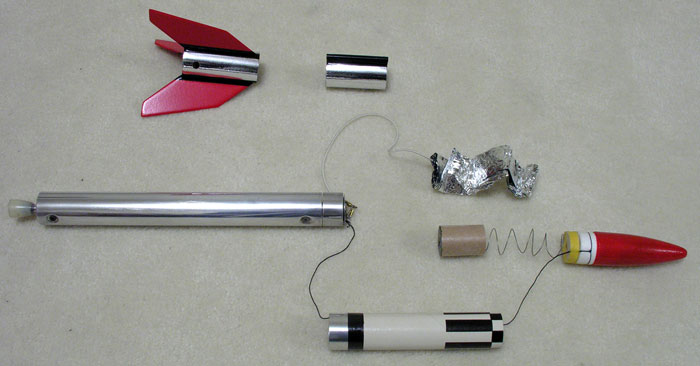Tom’s Vashon Rocketry Site
| Return to My Fleet |  |
Valkyrie-2b My Valkyrie-2b is similar in appearance to the standard late-model Vashon Valkyrie-2 configuration with the V-2 motor, cardboard parachute tube, and styrofoam nose. But it incorporates several modifications, hence the 'b' in its name. Rather than attach plastic fin rails and the launch guide to the motor tube using contact cement, this model has the fins and launch guide glued to pieces of ST-10 body tube that are friction fit to the motor casing (see photo below). I've had Vashon's standard method of attaching the fins using contact cement fail in the past, so I wanted something stronger. Also, my method allows me to keep the collectable vashon motor in a more pristine condition. ST-10 is an old Centuri body tube size with an inside diameter of 1 inch. I got some from Balsa Machining Services, but it was a very tight fit over the Vashon motor and required sanding the inside of the tube to make it fit. The ST-10 tubes available from Semroc fit without the need for sanding. I apply tape to the inside of the tubes as needed for a tight friction fit onto the motor. The fins are made of 1/16-inch aircraft plywood for strength, and they are attached with epoxy fillets. The fin unit is painted in black and red, and then adhesive aluminized mylar is applied so the model resembles a standard Vashon construction when seen from a distance. A more important modification is the parachute ejection spring. I always thought that Vashon's method of recovery system deployment ("the parachute tube falls off, and then we hope the parachute falls out") was the weakest part of the Vashon design. My ejection spring unit consists of a relatively weak spring (which I made from 0.02-inch steel music wire), a balsa disk in a piston tube (the tube is BT-50 that was split, curled to a smaller diameter, and glued to slide loosely inside the parachute tube), and another balsa disk to anchor the spring (this disk is taped to the base of the nose). The end of the piston reaches the bottom of the parachute tube when released, providing a gentle but definite force to push the parachute out of the compartment. (Click on the pictures for a larger images)
|
|
 |
|
Page last updated February 5, 2007
